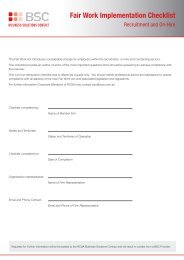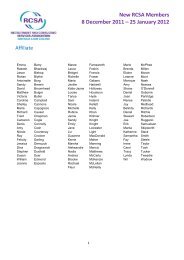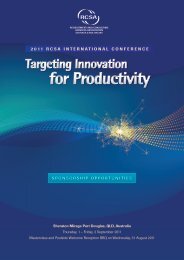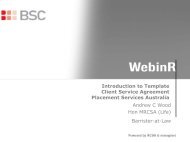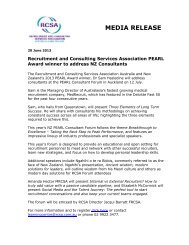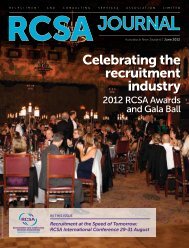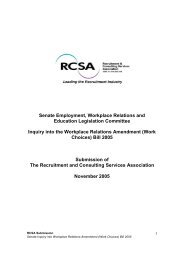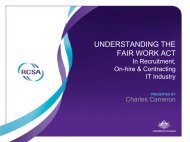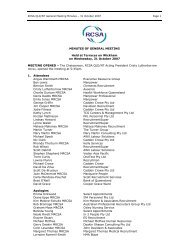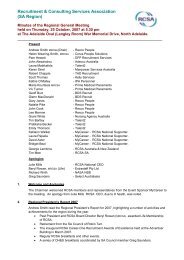Unfair Dismissal - RCSA
Unfair Dismissal - RCSA
Unfair Dismissal - RCSA
Create successful ePaper yourself
Turn your PDF publications into a flip-book with our unique Google optimized e-Paper software.
Fair Work Australia has discretion to deal with appeals as it considers appropriate. Appeals<br />
will be conducted in a hearing unless Fair Work Australia decides that the appeal can be<br />
determined without oral submissions and the parties agree to the appeal being conducted<br />
without a hearing.<br />
What has changed?<br />
Workplace Relations Act 1996 Fair Work Act 2009<br />
A person who had been dismissed had 21<br />
days to make an unfair dismissal application.<br />
Australian Industrial Relations Commission<br />
would attempt to conciliate an unfair<br />
dismissal claim, if unsuccessful the case<br />
would then move to arbitration and a<br />
binding order would be made.<br />
The AIRC could grant appeals in an unfair<br />
dismissal case, except for certain matters.<br />
A person who has been dismissed has 14<br />
days to make an unfair dismissal application.<br />
Fair Work Australia will hold a conference or<br />
a hearing in an unfair dismissal case that<br />
involves contested facts.<br />
Fair Work Australia conferences are informal<br />
and are the preferred option in an unfair<br />
dismissal claim, but Fair Work Australia can<br />
conduct a public hearing if they consider it<br />
would be the most effective and efficient<br />
way of dealing with the claim.<br />
Fair Work Australia cannot grant appeals<br />
from a decision made in an unfair dismissal<br />
case unless it is in the public interest to do<br />
so. An appeal on a question of fact can only<br />
be made on the ground that the decision<br />
involved a significant error of fact.<br />
What sort of outcomes can Fair Work Australia consider?<br />
Reinstatement<br />
Reinstatement will be Fair Work Australia’s primary remedy for unfair dismissal. An order for<br />
reinstatement must be to reappoint the person to the position they had immediately before<br />
the dismissal or appoint them to another position that has terms and conditions no less<br />
favourable than the position they held previously. Fair Work Australia can make a<br />
reinstatement order applying to an associated entity of the person’s previous employer<br />
where the person’s position no longer exists with the original employer but that position, or<br />
an equivalent position, is available in an associated entity (Section 391(1A)).<br />
What is an “associated entity”?<br />
An associated entity is defined under section 50AAA of the Corporations Act 2001. It includes<br />
“related bodies corporate”. In unfair dismissal matters, Fair Work Australia will have the<br />
power to order the reinstatement of an employee to an associated entity. This is a new<br />
feature under the Fair Work Act.<br />
Fair Work Australia can make any other order that it considers appropriate to maintain the<br />
person’s continuity of employment and the period of the person’s continuous service with<br />
the employer.<br />
Fair Work Australia can also make any other order it considers appropriate for an employer<br />
to pay an amount for remuneration lost or likely to have been lost because of the dismissal.<br />
This could include any money the person may have earned during the period since the<br />
dismissal. As these orders are only to compensate for lost remuneration, they cannot extend<br />
9



